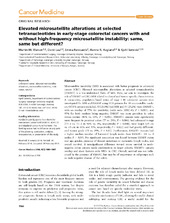| dc.contributor.author | Watson, Martin M | en_US |
| dc.contributor.author | Lea, Dordi | en_US |
| dc.contributor.author | Rewcastle, Emma | en_US |
| dc.contributor.author | Hagland, Hanne Røland | en_US |
| dc.contributor.author | Søreide, Kjetil | en_US |
| dc.date.accessioned | 2017-08-03T08:59:13Z | |
| dc.date.available | 2017-08-03T08:59:13Z | |
| dc.date.issued | 2016-07 | |
| dc.Published | Watson MMC, Lea D, Rewcastle, Hagland H, Søreide K. Elevated microsatellite alterations at selected tetranucleotides in early-stage colorectal cancers with and without high-frequency microsatellite instability: same, same but different?. Cancer Medicine. 2016;5(7):1580-1587 | eng |
| dc.identifier.issn | 2045-7634 | |
| dc.identifier.uri | https://hdl.handle.net/1956/16190 | |
| dc.description.abstract | Microsatellite instability (MSI) is associated with better prognosis in colorectal cancer (CRC). Elevated microsatellite alterations at selected tetranucleotides (EMAST) is a less-understood form of MSI. Here, we aim to investigate the role of EMAST in CRC±MSI related to clinical and tumor-specific characteristics. A consecutive, population-based series of stage I–III colorectal cancers were investigated for MSI and EMAST using PCR primers for 10 microsatellite markers. Of 151 patients included, 33 (21.8%) had MSI and 35 (23.2%) were EMAST+, with an overlap of 77% for positivity, (odds ratio [OR] 61; P < 0.001), and 95% for both markers being negative. EMAST was more prevalent in colon versus rectum (86% vs. 14%, P = 0.004). EMAST+ cancers were significantly more frequent in proximal colon (77 vs. 23%, P = 0.004), had advanced t-stage (T3–4 vs. T1–2 in 94% vs. 6%, respectively; P = 0.008), were larger (≥5 cm vs. <5 cm in 63% and 37%, respectively; P = 0.022) and had poorly differentiated tumor grade (71 vs. 29%, P < 0.01). Furthermore, EMAST+ tumors had a higher median number of harvested lymph nodes than EMAST− (11 vs. 9 nodes; P = 0.03). No significant association was found between EMAST status and age, gender, presence of distant metastases or metastatic lymph nodes, and overall survival. A nonsignificant difference toward worse survival in node-negative colon cancers needs confirmation in larger cohorts. EMAST+ cancers overlap and share features with MSI+ in CRC. Overall, survival was not influenced by the presence of EMAST, but may be of importance in subgroups such as node-negative disease of the colon. | en_US |
| dc.language.iso | eng | eng |
| dc.publisher | Wiley | eng |
| dc.rights | Attribution CC BY | eng |
| dc.rights.uri | http://creativecommons.org/licenses/by/4.0/ | eng |
| dc.subject | Colorectal cancer | eng |
| dc.subject | elevated microsatellite alterations | eng |
| dc.subject | microsatellite instability | eng |
| dc.subject | node status | eng |
| dc.subject | Survival | eng |
| dc.title | Elevated microsatellite alterations at selected tetranucleotides in early-stage colorectal cancers with and without high-frequency microsatellite instability: same, same but different? | en_US |
| dc.type | Peer reviewed | |
| dc.type | Journal article | |
| dc.date.updated | 2017-05-08T09:55:26Z | |
| dc.description.version | publishedVersion | en_US |
| dc.rights.holder | Copyright 2016 The Author(s) | |
| dc.identifier.doi | https://doi.org/10.1002/cam4.709 | |
| dc.identifier.cristin | 1429089 | |
| dc.source.journal | Cancer Medicine | |

